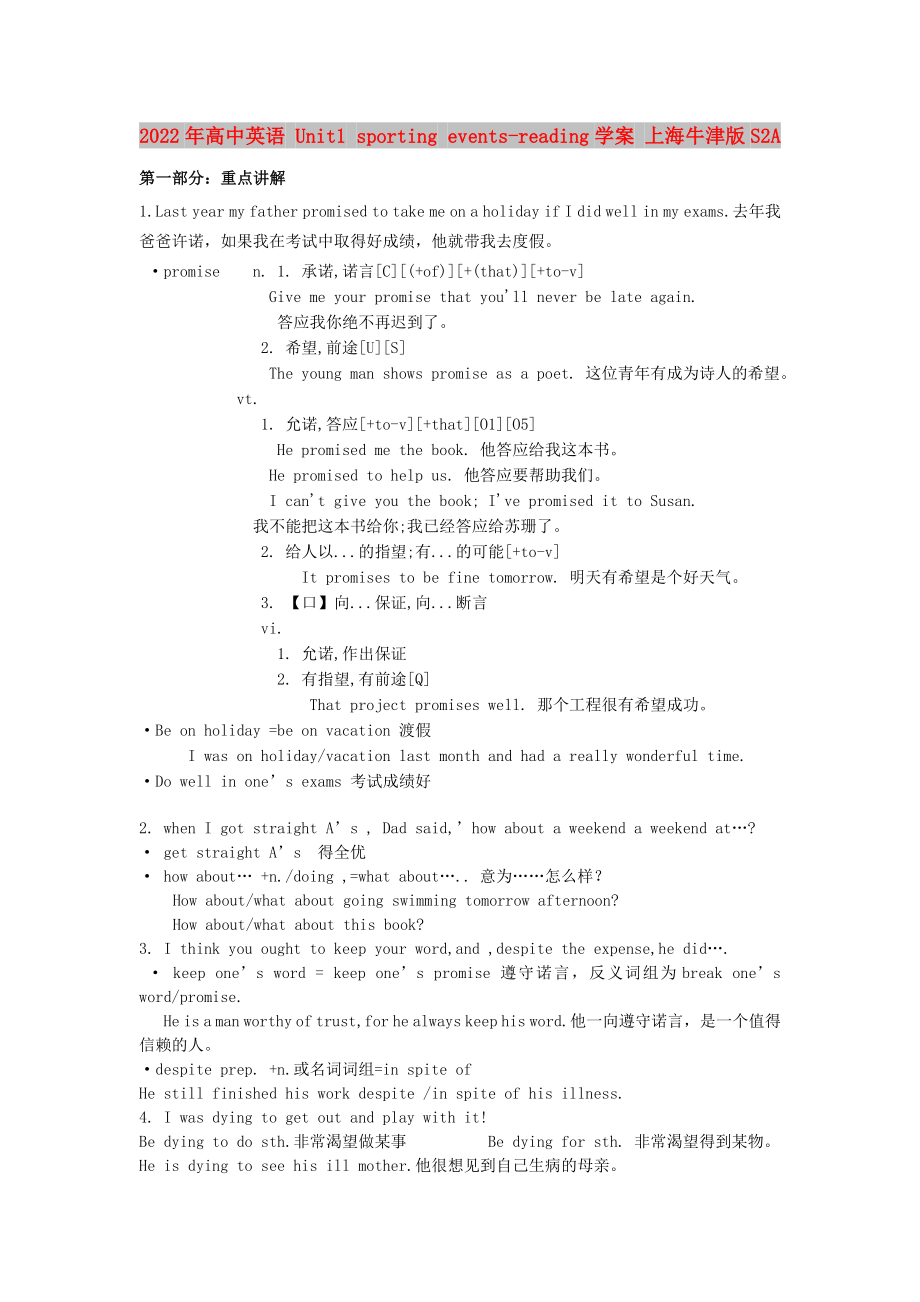《2022年高中英語 Unit1 sporting events-reading學(xué)案 上海牛津版S2A》由會(huì)員分享��,可在線閱讀��,更多相關(guān)《2022年高中英語 Unit1 sporting events-reading學(xué)案 上海牛津版S2A(3頁珍藏版)》請(qǐng)?jiān)谘b配圖網(wǎng)上搜索��。
1��、2022年高中英語 Unit1 sporting events-reading學(xué)案 上海牛津版S2A
第一部分:重點(diǎn)講解
1.Last year my father promised to take me on a holiday if I did well in my exams.去年我爸爸許諾��,如果我在考試中取得好成績(jī)��,他就帶我去度假��。
·promise n. 1. 承諾,諾言[C][(+of)][+(that)][+to-v]
Give me your promise that you'll never be late again.
答應(yīng)我你絕不再遲到了��。
2.
2��、希望,前途[U][S]
The young man shows promise as a poet. 這位青年有成為詩人的希望��。
vt.
1. 允諾,答應(yīng)[+to-v][+that][O1][O5]
He promised me the book. 他答應(yīng)給我這本書��。
He promised to help us. 他答應(yīng)要幫助我們。
I can't give you the book; I've promised it to Susan.
我不能把這本書給你;我已經(jīng)答應(yīng)給蘇珊了��。
2. 給人以...的指望;有...的可能[+to-v]
3��、
It promises to be fine tomorrow. 明天有希望是個(gè)好天氣��。
3. 【口】向...保證,向...斷言
vi.
1. 允諾,作出保證
2. 有指望,有前途[Q]
That project promises well. 那個(gè)工程很有希望成功��。
·Be on holiday =be on vacation 渡假
I was on holiday/vacation last month and had a really wonderful time.
·Do well in one’s exams 考試成績(jī)好
2. when I
4��、 got straight A’s , Dad said,’how about a weekend a weekend at…?
· get straight A’s 得全優(yōu)
· how about… +n./doing ,=what about….. 意為……怎么樣��?
How about/what about going swimming tomorrow afternoon?
How about/what about this book?
3. I think you ought to keep your word,and ,despite the expense,he did
5��、….
· keep one’s word = keep one’s promise 遵守諾言��,反義詞組為break one’s word/promise.
He is a man worthy of trust,for he always keep his word.他一向遵守諾言��,是一個(gè)值得信賴的人��。
·despite prep. +n.或名詞詞組=in spite of
He still finished his work despite /in spite of his illness.
4. I was dying to get out and play with
6��、it!
Be dying to do sth.非?�?释瞿呈? Be dying for sth. 非常渴望得到某物��。
He is dying to see his ill mother.他很想見到自己生病的母親��。
I’m dying for a newfanshioned Mp4.
5.we could not wait to try ti ourselves.我們迫不及待的躍躍欲試��。
Cannot wait to do sth.. 迫不及待做某事��。
I cannot wait to read this novel.
6. Wearing skis for th
7��、e first time makes you feel very strange.第一次穿上滑雪板的感覺很不舒服��。
本句中Wearing skis for the first time是動(dòng)名詞短語作主語��。動(dòng)名詞短語作主語��,泛指抽象的活動(dòng)或一般的習(xí)慣��,即表示抽象的概念��,多為持續(xù)反復(fù)的動(dòng)作��,時(shí)間概念不強(qiáng)��;不定式作主語指具體的特定的動(dòng)作或?qū)淼膭?dòng)作��,多為一次性動(dòng)作��。
如:Working here is quite challenging.
To work there is my dream.
若主語太長��,用it作形式主語��。It is no use crying over the
8��、 spilt milk.
在少數(shù)情況下��,不定式不指具體動(dòng)作��,這時(shí)可與動(dòng)名詞互換��,常見于諺語或格言中��。
e.g. Seeing is believing.
To see is to believe.
·feel strange 覺得不舒服
Can you pass me the medicine? I feel a bit strange.你能把藥遞給我么��,我覺得有點(diǎn)不舒服��。
7.to be honest, that first lesson was not a great success.
· success 作為可數(shù)名詞��,指“成功的事物或人”
He is a great
9��、 success. 他是一個(gè)成功的人��。
The summit was a big success. 這次峰會(huì)非常成功。
8. I only fell over a few times, and I managed to do a few longer runs.
Manage to do = succeed in doing sth. (經(jīng)過努力)設(shè)法成功做成��。
Try to do 盡力做(結(jié)果未必成功)
He tried to fufil the task, but failed.
第二部分:隨堂過關(guān)
1. ___ the meeting himself gave them a
10��、 great deal of encouragement.
A. The president will attend B. The president to attend
C. The president attended D. The president’s attending
2. It is important ___ you ___ correct intonation on the phone.
A. of, to use B. for, to use C. of, using D. for, using
3.The young man made a
11��、 _________to his parents that he would try to earn his own living after graduation.
A.prediction B.promise C.plan D.contribution
4.The secretary asked me into the office so that the manager?_________ speak to me .
A. might B. would C. will D. could
5.He has not sent me?his address so that I ?_________ write?to him.
A. would not B.shall not be able to C.should not D.could not
Answers:
1.D 2.B 3. B. 4. A might表示也許可能��,一種猜測(cè)或未定性的活動(dòng)��。
5. Bbe able to 在這兒表示"能夠"��。句意為“他沒有給我地址使得我無法給他寫信��?�!?
 2022年高中英語 Unit1 sporting events-reading學(xué)案 上海牛津版S2A
2022年高中英語 Unit1 sporting events-reading學(xué)案 上海牛津版S2A

